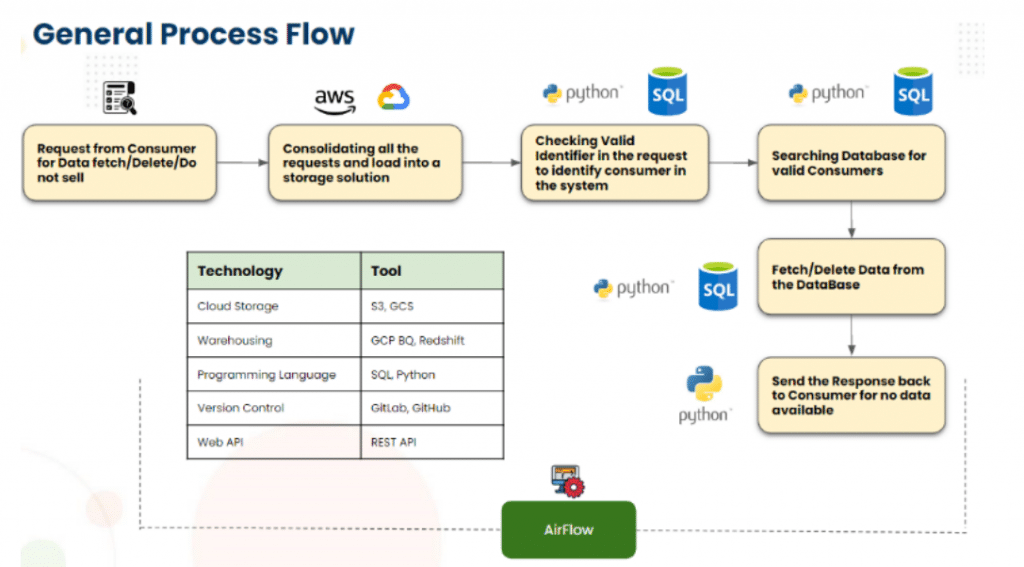Executive Summary
The client is an American multinational retail corporation with multiple department stores, specialty stores, and e-commerce websites. It operates over 700 stores in the United States, Puerto Rico, and Guam. In response to the regulatory shift with California Consumer Privacy Act (CCPA), the retail giant embarked on a strategic initiative to align seamlessly with CCPA’s mandates and to elevate customer satisfaction across its units.
Typically, when a customer inquired about their data, the process involved manually fetching of information from the CIM (Customer Information Management) table and sending the response back to the customer. This process was time-consuming, error-prone, and lacked efficiency. Factspan’s team embarked on a project to create an automated solution catering to CCPAcompliant customer data requests. This encompassed enhancing transparency through clear insights into data usage, empowering customers with data control for informed decision-making, ensuring seamless compliance with CCPA regulations, and fostering elevated customer satisfaction and trust via a streamlined and transparent data request process.
About the Client
The client, a leading retailer in the United States, operates over 700 department stores, specialty stores, and e-commerce websites. They sell a wide variety of merchandise, including home goods, apparel, shoes, watches, jewelry, handbags, and accessories.
In recent years, the company has received awards for its commitment to sustainability by using solstice refrigerants in its stores and its best-in-class own brands of products. The client is also committed to protecting consumer privacy and complying with applicable privacy laws and regulations. The company regularly reviews its privacy practices to ensure that they are up-to-date and compliant.
Business Challenge
The American department chain has always prioritized tailor-made tools for internal processes. With the California Consumer Privacy Act (CCPA) granting customers the right to understand how their data is used, client company identified the need to further enhance transparency, control, and decision-making for their customers while ensuring strict compliance.
Typically, the client handled customer data requests manually. When a customer inquired about their data, the process involved manually fetching information from the CIM (Customer Information Management) table and sending the response back to the customer. This process was time-consuming, error-prone, and lacked efficiency. They recognized the need for an automated solution that not only streamlines the data request process but also ensures compliance. The objective was to develop an automated solution that aligns with the company’s overarching philosophy and best practices.
Our Solution
The solution entailed automating the retrieval of customer data from company’s database and promptly sending back accurate responses to customers. To address this challenge, Factspan team opted for a Python-based in-house solution. This choice was driven by the need for a customized approach that aligned perfectly with company’s internal practices.

Workflow Implementation:
1. Data Retrieval: The automation process initiated by querying the required customer data from the company’s database using GCP BQ.
2. Data Processing and Storage: The retrieved data was then processed and temporarily stored in a GCS Bucket, ensuring efficient data management.
3. Response Generation: The Python scripts processed the data and generated personalized responses for each customer query.
4. Response Dispatch: The automated process promptly dispatched responses to the respective customers, eliminating manual intervention.
The Python-based in-house solution yielded significant benefits for the company like the solution was tailored to company’s specific requirements, reflecting the company’s commitment to custom-built tools and the automated system ensured that customer data requests adhered to data protection regulations.
Business Impact
- Manual intervention was eradicated, leading to faster response times (reduced SLA time from 30 days to 1 day) and increased customer satisfaction.
- Utilizing Python and in-house development reduced the reliance on external resources, resulting in cost savings by 20%
- Customers gained a comprehensive view of their data usage and gained control over their information.
Featured content

Enhancing Retail Data Quality with Apach...

Technical Challenges In Building An Ente...

Data Quality Frameworks for Retail Opera...

Cloud Orchestration Upgrade to Transform...

Retailer’s Journey to Accelerated Data...

Enhanced Customer Analysis through Power...

Enhanced Customer Engagement through Uni...

CDP and UCV: The Secret Weapon for Retai...

Sentiment Analysis in Retail: Enhancing ...

